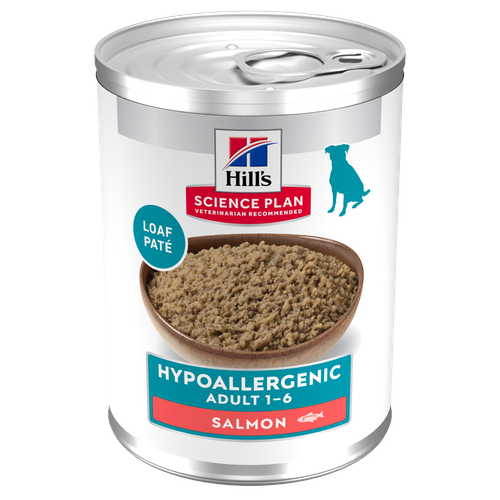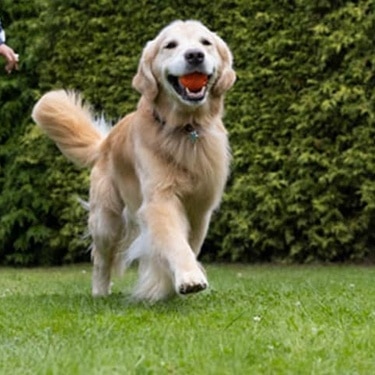
-
Find the right food for your petTake this quiz to see which food may be the best for your furry friend.Find the right food for your petTake this quiz to see which food may be the best for your furry friend.Featured products
 Adult Wet Dog Food with Beef
Adult Wet Dog Food with BeefHill's Science Plan Adult Multipack Wet Dog Food with Chicken, Beef & Turkey are complete premium pet foods for adult dogs from 1 year. Your dog will love these deliciously smooth and savoury minced loaves, formulated for balanced nutrition and overall health.
Shop Now Mature Adult Dog Food
Mature Adult Dog FoodHill's Science Plan Mature Adult Multipack Wet Dog Food with Chicken & Beef are complete premium pet foods for mature adult dogs from 7 years. Your dog will love these deliciously smooth and savoury minced loaves, formulated to deliver the appropriate amount of energy to support the needs of adult dogs.
Shop Now Puppy Food
Puppy FoodHill's Science Plan Puppy Multipack Wet Dog Food with Chicken & Beef are complete premium pet foods for growing puppies from weaning until 1 year old and for pregnant and nursing dogs. Your puppy will love these deliciously smooth and savoury minced loaves, formulated for balanced nutrition and overall health.
Shop NowFeatured products Hairball & Perfect Coat Adult Dry Cat Food with Chicken
Hairball & Perfect Coat Adult Dry Cat Food with ChickenHill's Science Plan Hairball & Perfect Coat Adult Cat Food with Chicken is formulated to effectively help avoid hairball formation in adult cats while promoting a beautiful coat. Thanks to its mix of essential omega-6 fatty acids, this food benefits the cat's skin and fur, keeping them healthy and shiny. Our Advanced Fibre Technology helps reduce hairballs by naturally promoting their passage through the gut. This food is formulated with high-quality protein for a perfectly balanced, great-tasting recipe.
Shop Now Sensitive Stomach & Skin Adult Cat Food
Sensitive Stomach & Skin Adult Cat FoodHill's Science Plan Sensitive Stomach & Skin Adult Wet Cat Food with Turkey is a complete pet food for adult cats, aged 1–6 years. This highly digestible wet food comes in a pouch and supports healthy digestion, as well as nourishes skin and promotes a thick and lustrous coat.
Shop Now Sterilised Adult Cat Food
Sterilised Adult Cat FoodHill's Science Plan Adult Sterilised Cat Dry Food with Salmon is specially formulated with ActivBiome+ Multi-Benefit Technology. It is a precisely balanced nutrition, tailored to meet the needs of sterilised cats, to help keep them lean & healthy.
Shop Now -
Dog
- Dog Tips & Articles
-
Health Category
- Weight
- Food & Environmental Sensitivities
- Urinary
- Digestive
- Joint
- Kidney
-
Life Stage
- Puppy Nutrition
- Adult Nutrition
- Senior Nutrition
Cat- Cat Tips & Articles
-
Health Category
- Weight
- Skin & Food Sensitivities
- Urinary
- Digestive
- Kidney
-
Life Stage
- Kitten Nutrition
- Adult Nutrition
Featured articles The Incredible Science Behind Your Pet's Microbiome
The Incredible Science Behind Your Pet's MicrobiomeLearn what your pet's microbiome is, how it contributes to your pet's gut and overall health, and why nutrition is important in maintaining healthy microbiomes.
Read More Show some love with wet foods: a great choice for pets with health issues
Show some love with wet foods: a great choice for pets with health issuesShow some love with wet foods: a great choice for pets with health issues.
Read More The Right Diet For Your Pet
The Right Diet For Your PetIn people, the right diet is very important. If you are eating the wrong way for your metabolism, activity level, age and lifestyle you could end up with health issues.
Read More -


Whether you’re a new dog owner or you’ve had dogs your whole life, sometimes a dog will act out of sorts and leave you wondering what they’re thinking or feeling and what’s causing their strange behaviour... Even if you suspect something is wrong, you may not know how to tell if they are actually sick, what a sick dog looks or acts like, or whether it’s actually worth a trip to the vets. While some symptoms of illness, such as vomiting or diarrhoea, can be obvious, many sickness behaviours in dogs can be easy to miss if you don't know what to look for. Here are a few symptoms and signs that can help you figure out if your dog could be unwell, and when you should consider contacting your veterinarian.
1: Changes in your dog’s eating habits and appetite
Most dogs will rarely miss a meal or special treat, especially when you put it in front of them. If your dog turns up their nose at their breakfast or dinner when they're normally gobbling it down, it's time to pay attention. Many things can cause a dog to stop eating, like nausea, tooth pain, anxiety, viral infections and gut pain. Dogs with mouth pain may look like they want to eat and go to the bowl but then walk away. Dogs that are genuinely off their food because of illness rarely even look at it.
Schedule an appointment with your veterinarian if your dog doesn't eat for more than a day or misses more than two meals.
It’s important to pay attention to appetite changes in the opposite direction, too. Increases in appetite could be a sign of parasitic worm infestation or metabolic diseases like diabetes or Cushing’s disease.


Tasty Tips
2: They're just lying around
If you notice that your dog is sleeping more, dragging behind on walks, uninterested in play, or not playing as much as they used to, then something might be wrong. Sometimes, it's just too hot outside to play and exercise. When the temperatures rise, dogs are naturally a little more lazy. On the other hand, if it's not hot, then this behaviour indicates that something more may be at play.
There are many things that can cause a loss of energy in a dog. Any kind of infection, whether it be viral, bacteria or fungal, can cause loss of energy. Heart disease or breathing problems of any kind can make a dog feel tired. Hormonal disorders, such as low thyroid function, can cause increased lethargy. Obesity can cause a dog to sleep more because it is exhausting to get around. Obesity can also lead to things like osteoarthritis (OA), also called degenerative joint disease, making it more painful for your dog to run and play. This can create a frustrating cycle where your dog may struggle to exercise, gain more weight and exercise even less. If your veterinarian suggests that your dog is obese, it is important to take their advice and work with them on a weight loss plan. Cancer, liver disease, kidney disease and neurological conditions such as seizures or canine cognitive dysfunction can also make a dog seem tired.
If your dog is getting up there in years, you might also think that they’re moving less due to old age. While it is true that dogs slow down as they get older, it doesn't mean they should stop moving altogether. Senior dogs (aged seven years and older) are still very capable of getting around and exercising. If your older dog doesn't seem to play like they used to, it's probably worth a call to the veterinarian to have them checked and rule out any possible ailments. As your dog ages, your veterinarian will likely want to perform additional tests to ensure your dog stays in tip-top shape.
Pain can also masquerade as loss of energy. Gastrointestinal problems that cause a painful belly can make a dog act lethargic, and if a dog is in pain from arthritic joint disease, the pain may just manifest as sleeping more.
The bottom line is that increased sleeping or apparent laziness can definitely signal a problem. If it lasts for more than a day, call your vet. It's always better to be proactive and call your vet than wonder if your dog is sick for days.
3: They're drinking a lot of water
If you notice that your dog is constantly draining the water bowl, asking to be let out more often, or having accidents in the house, then your dog might be sick. Drinking a lot from excessive thirst is called polydipsia. Some of the common causes of polydipsia include hormonal conditions such as diabetes mellitus or hyperadrenocorticism, also known as Cushing's disease, says the PDSA. Kidney disease and severe uterine infections can also cause a dog to drink more. If you notice that your dog is drinking more than normal, it's not hot outside and the behaviour lasts more than a day or two, call your vet and make an appointment.
4: Weight changes
Both weight gain and loss can be signs of various illnesses. It’s really important to regularly weigh your dog throughout their life. Most vet clinics will happily let you pop in to weigh your dog for free. It’s a good way to get them to feel comfortable at the clinic and lets you spot subtle changes in their weight before anything gets too severe. Try to weigh them at least once a month.
Weight loss can be hard to detect, especially if your dog has long hair. Dogs lose weight for one of two reasons: either they aren't eating or absorbing enough nutrients, or they’re burning too many calories. Cancer, diabetes, liver disease and kidney disease, as well as other diseases such as intestinal disease, all cause weight loss. If you see weight loss or start to notice that your dog's ribs or hips are sticking out more than usual, then your dog could be sick and should be examined by your veterinarian.
What about your dog’s dry nose?
Lots of people still expound the myth of the dog’s wet or dry nose! There is no truth that a dry nose means an ill dog or vice versa. In fact, the moisture of your dog’s nose may vary throughout the day. Although some diseases can affect the nose, whether it is wet or dry is not usually relevant. You can read more about noses here!
Know what’s normal for your dog
The best way to tell if something is wrong is to know how your dog behaves normally, including their eating, drinking, urinating and defecating patterns, as well as what their normal stool looks like and what their normal energy level is. When petting your dog, feel all over and look for anything out of the ordinary, like rashes, lumps and bumps. There are ways to easily test if your dog is at a normal weight, so be sure to test your dog’s weight status at home regularly.
You know your dog better than anyone, and if something makes you wonder if there is something wrong with them or they might be sick, trust your gut and enlist the help of your veterinarian.


Dr. Sarah Wooten graduated from UC Davis School of Veterinary Medicine in 2002. A member of the American Society of Veterinary Journalists, Dr. Wooten divides her professional time between small animal practice in Greeley, Colorado, public speaking on associate issues, leadership, and client communication, and writing. She enjoys camping with her family, skiing, SCUBA, and participating in triathlons.
Related products

Hill's Science Plan Hypoallergenic Adult Wet Dog Food with Salmon is a complete premium pet food for all adult dogs from 1 year. This savoury tinned loaf is specially formulated for dogs with delicate skin and stomachs. It features a single novel animal protein source and is grain-free.

Hill's Science Plan Mature Adult Multipack Wet Dog Food with Chicken & Beef are complete premium pet foods for mature adult dogs from 7 years. Your dog will love these deliciously smooth and savoury minced loaves, formulated to deliver the appropriate amount of energy to support the needs of adult dogs.

Hill's Science Plan Adult Multipack Wet Dog Food with Chicken, Beef & Turkey are complete premium pet foods for adult dogs from 1 year. Your dog will love these deliciously smooth and savoury minced loaves, formulated for balanced nutrition and overall health.

Hill's Science Plan Puppy Multipack Wet Dog Food with Chicken & Beef are complete premium pet foods for growing puppies from weaning until 1 year old and for pregnant and nursing dogs. Your puppy will love these deliciously smooth and savoury minced loaves, formulated for balanced nutrition and overall health.
Related articles

Discover the causes, signs, and treatments of kidney disease in dogs and find methods of supporting your dog's kidney health. Learn more at Hill's Pet UK.

Just like every other pet owner, vets are responsible for giving their pets the best possible nutrition, exercise and care needed to keep them healthy and happy.

Dog obesity is a significant problem - learn more about helping your dog become trimmer and healthier through improved nutrition.

Wondering why your dog is constantly itching? Read on to discover common causes, such as allergies or parasites, and find out how you can help your dog.

Put your dog on a diet without them knowing
Our low calorie formula helps you control your dog's weight. It's packed with high-quality protein for building lean muscles, and made with purposeful ingredients for a flavourful, nutritious meal. Clinically proven antioxidants, Vitamin C+E, help promote a healthy immune system.
Put your dog on a diet without them knowing
Our low calorie formula helps you control your dog's weight. It's packed with high-quality protein for building lean muscles, and made with purposeful ingredients for a flavourful, nutritious meal. Clinically proven antioxidants, Vitamin C+E, help promote a healthy immune system.

